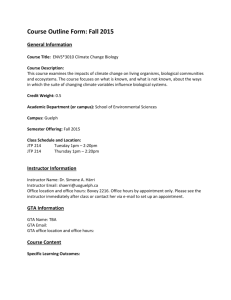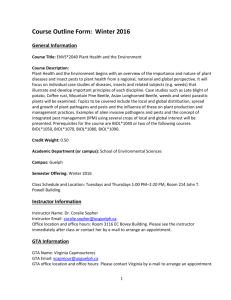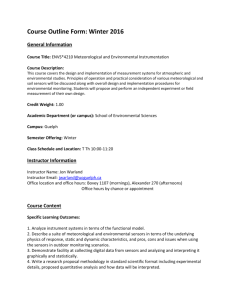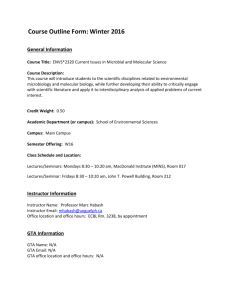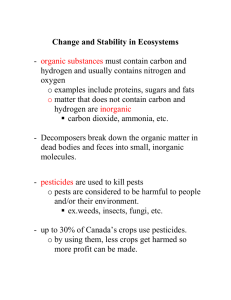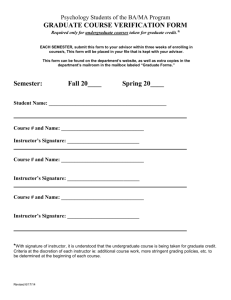ENVS*3020 Pesticides and the Environment
advertisement
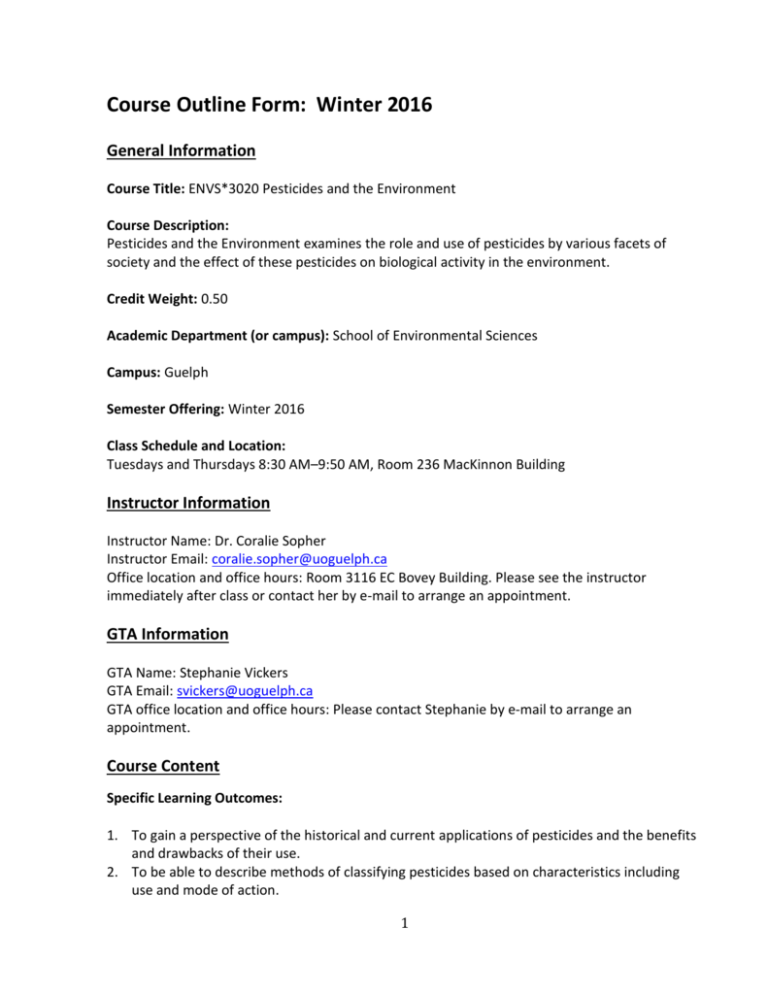
Course Outline Form: Winter 2016 General Information Course Title: ENVS*3020 Pesticides and the Environment Course Description: Pesticides and the Environment examines the role and use of pesticides by various facets of society and the effect of these pesticides on biological activity in the environment. Credit Weight: 0.50 Academic Department (or campus): School of Environmental Sciences Campus: Guelph Semester Offering: Winter 2016 Class Schedule and Location: Tuesdays and Thursdays 8:30 AM–9:50 AM, Room 236 MacKinnon Building Instructor Information Instructor Name: Dr. Coralie Sopher Instructor Email: coralie.sopher@uoguelph.ca Office location and office hours: Room 3116 EC Bovey Building. Please see the instructor immediately after class or contact her by e-mail to arrange an appointment. GTA Information GTA Name: Stephanie Vickers GTA Email: svickers@uoguelph.ca GTA office location and office hours: Please contact Stephanie by e-mail to arrange an appointment. Course Content Specific Learning Outcomes: 1. To gain a perspective of the historical and current applications of pesticides and the benefits and drawbacks of their use. 2. To be able to describe methods of classifying pesticides based on characteristics including use and mode of action. 1 3. To be able to understand important chemical, physical and biological properties of pesticides that are important for predicting their fate and impact in the environment. 4. To gain experience in formulating objective research questions to address current pesticiderelated topics. 5. To gain an understanding of the role of risk assessment in monitoring and managing existing and emerging concerns with pesticides. 6. To be aware of regulations governing the use of pesticides locally to internationally. 7. To be able to extrapolate from the principles learned in this course to a broader range of environmental issues. Course Assignments and Tests: Assignment or Test Due Date Annotated bibliography February 2; electronic submission by 4 PM Midterm Examination Essay February 11, in class March 8; electronic submission by 4 PM March 29; electronic submission by 4 PM Revised submission of research portion of essay Final Examination April 19 11:30AM 1:30PM, room TBA Contribution to Final Mark (%) Learning Outcomes Assessed 10 4-5 20 1-7 25 4-5 10 4-5 35 1-7 Lecture Content: Lecture topics include the following and are subject to change. Past, present and future discovery and use of pesticides Classification methods for pesticides Classic and current topics related to pesticides Local to international regulations Impact of pesticides on the environment Environmental fate of pesticides Pesticide resistance Safe handling of pesticides Role of risk assessment Final examination date and time: April 19, 11:30AM - 1:30PM Final exam weighting: 35% 2 Course Resources Required Texts: None Recommended Texts: None Lab Manual: None Other Resources: The instructor will post announcements, hand-outs, and slides from lectures and other material that will enhance your understanding of the course content on CourseLink. All course materials made available through CourseLink and all items covered in class are considered required, unless the instructor explicitly indicates otherwise. Please check the CourseLink site often. Field Trips: None Additional Costs: None Course Policies Grading Policies: Annotated bibliography: Special instructions on the requirements for this assignment will be provided separately. This is valued at 10% of your final mark and due by 4 PM February 2, by electronic submission to the Dropbox in CourseLink. Midterm Examination: The Midterm exam is worth 20% of your final mark. It will take place during the regular lecture period on February 11. The Midterm exam will cover all material (including guest lectures) up to and including the February 9 lecture. Midterm exams will not be returned, however they may be viewed and discussed by appointment with the instructor. Essay: Special instructions on the requirements for this assignment will be provided separately. The essay is worth 25% of your final mark and due by 4 PM March 8, by electronic submission to the Dropbox in CourseLink. Revised submission of research portion of the essay: Special instructions on the requirements for this assignment will be provided separately. This is worth 10% of your final mark and due by 4 PM March 29, by electronic submission to the Dropbox in CourseLink. Final Examination: The final exam is worth 35% of your final mark and will take place on April 19, 11:30 AM - 1:30 PM, location TBA. It will cover all material presented in the course following the Midterm examination. Policy on Late Assignments: Late assignments will be penalized 10% of the total marks available for the assignment per day, including weekend-days, and will no longer be accepted five days 3 after the due date, resulting in a mark of zero for the assignment. If you cannot meet a course requirement or unfortunately miss an exam, please advise the instructor as soon as possible by e-mail. Extensions and rescheduling of a missed exam will only be granted for medical reasons, documented by a doctor’s note; or for documented compassionate reasons, at the discretion of the instructor. Copies of Out-of-Class Assignments: Keep paper and/or other reliable electronic back-up copies of all out-of-class assignments: you may be asked to resubmit work at any time. Course Policy on Group Work: Group work for marked assignments is not permitted. Course Policy regarding use of electronic devices and recording of lectures: Electronic recording of classes is expressly forbidden without consent of the instructor. When recordings are permitted they are solely for the use of the authorized student and may not be reproduced, or transmitted to others, without the express written consent of the instructor. Material recorded with permission is restricted to use for this course unless further permission is granted. University Policies Academic Consideration: The University of Guelph is committed to supporting students in their learning experiences and responding to their individual needs and is aware that a variety of situations or events beyond the student's control may affect academic performance. Support is provided to accommodate academic needs in the face of personal difficulties or unforeseen events in the form of Academic Consideration. Information on regulations and procedures for Academic Consideration, Appeals and Petitions, including categories, grounds, timelines and appeals can be found in Section VIII (Undergraduate Degree Regulations and Procedures) of the Undergraduate Calendar Academic Misconduct: The University of Guelph is committed to upholding the highest standards of academic integrity and it is the responsibility of all members of the University community, faculty, staff, and students to be aware of what constitutes academic misconduct and to do as much as possible to prevent academic offences from occurring. University of Guelph students have the responsibility of abiding by the University's policy on academic misconduct regardless of their location of study; faculty, staff and students have the responsibility of supporting an environment that discourages misconduct. Students need to 4 remain aware that instructors have access to and the right to use electronic and other means of detection. Please note: Whether or not a student intended to commit academic misconduct is not relevant for a finding of guilt. Hurried or careless submission of assignments does not excuse students from responsibility for verifying the academic integrity of their work before submitting it. Students who are in any doubt as to whether an action on their part could be construed as an academic offence should consult with a faculty member or faculty advisor. Detailed information regarding the Academic Misconduct policy is available in Section VIII (Undergraduate Degree Regulations and Procedures) of the Undergraduate Calendar Accessibility: The University of Guelph is committed to creating a barrier-free environment. Providing services for students is a shared responsibility among students, faculty and administrators. This relationship is based on respect of individual rights, the dignity of the individual and the University community's shared commitment to an open and supportive learning environment. Students requiring service or accommodation, whether due to an identified, ongoing disability or a short-term disability should contact the Student Accessibility Services (SAS), formerly Centre for Students with Disabilities (CSD), as soon as possible. For more information, contact SAS at 519-824-4120 ext. 56208 or email sas@uoguelph.ca or visit the Student Accessibility Services website (http://www.uoguelph.ca/csd/) Course Evaluation Information: End of semester course and instructor evaluations provide students the opportunity to have their comments and opinions used as an important component in the Faculty Tenure and Promotion process, and as valuable feedback to help instructors enhance the quality of their teaching effectiveness and course delivery. While many course evaluations are conducted in class others are now conducted online. Please refer to the Course and Instructor Evaluation Website for more information. Drop period: The drop period for single semester courses starts at the beginning of the add period and extends to the Fortieth (40th) class day of the current semester (the last date to drop a single semester courses without academic penalty) which is listed in Section III (Schedule of Dates) of the Undergraduate Calendar. The drop period for two semester courses starts at the beginning of the add period in the first semester and extends to the last day of the add period in the second semester. Information about Dropping Courses can be found in Section VIII (Undergraduate Degree Regulations and Procedures) of the Undergraduate Calendar. 5 Additional Course Information Students may use laptops and tablets to take notes, however these devices should not be used for accessing social media sites or other non-class-related materials during lecture periods. You may not distribute any PowerPoint slides, outlines, lecture notes, exams and other assignments publicly, including to internet sites (e.g. Course Hero; OneClass). 6
